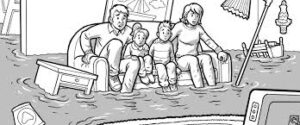 July 2025
July 2025
An interesting discussion on the value of maintaining reserve funds is taking place in British Columbia.
Last year the province began requiring stratas (condominium corporations in Ontario) to maintain cash reserves to cover major repairs and replacements. See Reserve Funds Now Mandatory in BC for details. Within the province, this is expected to eliminate surprise levies and last-minute financial panics. In short, maintaining reserve funds is now mandatory in that province and expected to save money for homeowners.
Not everyone in the province agrees that mandatory funding of reserve funds is beneficial.
This discussion played out on LinkedIn where one writes “This could mean a major shift in how stratas operate. Imagine higher monthly fees for years to come, all in the name of “planning ahead.”” Also, “Some argue it’s a lifeline for aging buildings; others see it as a financial burden for owners already stretched thin.”
One argued that “Renters will lose heavily in this scenario.” Yet another claims this change “will impact housing costs/affordability” and “Your average strata homeowner will not be able to afford the cost of the home.”
 For too many years, strata owners in BC have suffered and paid the cost of not adequately funding their reserve fund. You may recall the Leaky Condo Crisis of the 1980s that caused billions of dollars in damage to tens of thousands of condominium homes.
For too many years, strata owners in BC have suffered and paid the cost of not adequately funding their reserve fund. You may recall the Leaky Condo Crisis of the 1980s that caused billions of dollars in damage to tens of thousands of condominium homes.
There are some inconvenient truths those opposing this change prefer not to acknowledge. One is that condominiums prices in Vancouver are comparable or higher to those in Toronto where funding of reserve funds is mandatory. Another is that buildings for residential housing need to be maintained if they are to outlast current occupants. Those who live in a building should not be allowed to degrade it, move elsewhere, and force others to pay these maintenance costs. Finally, residential housing is designed for people to live in and not speculators or investors. Landlords seeking maximum revenues and minimum expenses should not be allowed to profit when they allow their real estate investments, and the homes for many people, to deteriorate due to lack of maintenance.
In practice, the Ontario approach does not eliminate surprise levies or last-minute financial panics. There remain ways to manipulate reserve fund studies and balances such that these surprises do occur. It is hoped that Ontario regulators eliminate opportunities for this to occur in the coming years. For now, Ontario condo owners deal with special assessments and levees less frequently. When they do occur, they are of lesser value.
Ontario never experienced British Columbia’s leaky condo crisis. Supporting Ontario’s better funded reserve funds has been found to be less expensive than British Columbia’s surprise levies. And, properties are not allowed to degrade because of owner refusal to fund necessary repairs.
Congratulations, British Columbia, on taking a major step to reducing condominium building maintenance and repair costs, and lowering the cost of home ownership and rentals.








